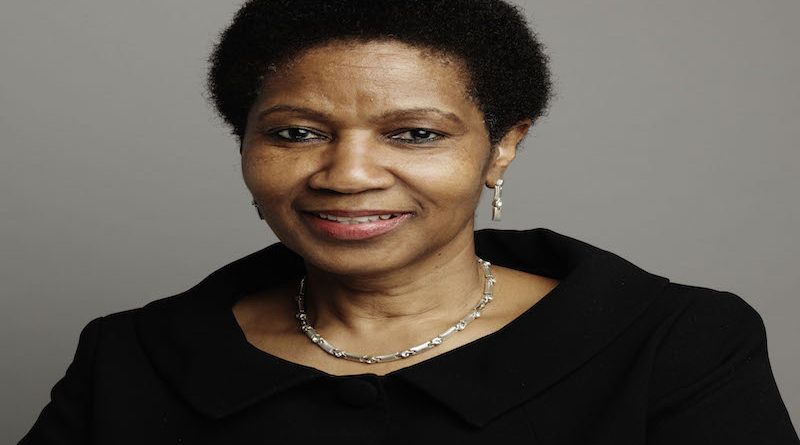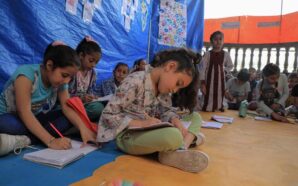In the wake of the upcoming Women’s Economic Empowerment Global Summit (WEEGS) to be held on 4th and 5th of December at Expo Centre Sharjah, Phumzile Mlambo-Ngcuka, Executive Director, UN Women, talks about the partnership with NAMA Women Advancement Establishment and the expected major outcomes of the much awaited summit. With a determined focus on gender-responsive procurement and increasing women’s participation in economic development, both the entities aim to identify and work upon key issues that hinder enabling of gender parity across workforces and communities.
- What is the ultimate aim of UN Women’s partnership with the Women’s Economic Empowerment Global Summit?
United Nations (UN) Women has partnered with NAMA Women Advancement Establishment for the Women’s Economic Empowerment Global Summit (WEEGS) to support women and create equal opportunities for them in local, regional as well as global value chains. Through this partnership, we want to strengthen and encourage women as entrepreneurs, business owners and employees. The actual purpose of the partnership is in line with the aim of the Summit, which is to propel ongoing efforts on women’s economic empowerment, one of UN Women’s key priorities and an integral part of the globally agreed Sustainable Development Goals (SDGs). The Summit reflects the recommendations of the UN Secretary-General’s High-Level Panel (HLP) on the topic of Women’s Economic Empowerment.
I would like to mention here, that the HLP was established because the United Nations Secretary-General recognized the criticality of women’s economic empowerment in achieving the SDGs. This panel then developed a set of actionable recommendations by identifying the drivers of economic growth. Although, the Panel’s work has officially come to a halt, but this Summit, conceived in the context of the HLP, carries forward its legacy to drive and scaled up the implementations.
- What tangible results would you hope to see as outcomes of this Summit?
Well, to start with, what we expect to see is an increased energy and commitment in the region to step up actions to promote women’s safe, fair and productive economic empowerment in the workplace, marketplace and community. Also, we now plan to launch our programme “Stimulating equal opportunities for women entrepreneurs”, which focuses on making business environment better for women-owned businesses by improving public and private procurement practices. It will also promote important women issues like safety in the workplace, capacity development and ease to access the finance. We are positive that, when combined, these supply and demand side interventions will lead to increased revenues that women can leverage and use.
Another outcome of the Summit that we hope to see, is increased and productive collaboration with the private sector. See, all companies have a stake in and are responsible for sustainable development, as employers, producers and investors. We must understand that their policies and practices can have a big impact on women who work and supply to them, as well as buy products and services from them.
“The partnership propel ongoing efforts on women’s economic empowerment, one of UN Women’s key priorities and an integral part of the globally agreed Sustainable Development Goals (SDGs)”
In addition to this, the corporate policies can also have a wider impact on society, and we all have a stake in their sustainability and inclusive practices. For this reason, we hope that this Summit will inspire us to work together as business, government, civil society and the UN, to ultimately create a safe and enabling environment for women’s economic empowerment.
- What tools are you using to measure the impact of women’s economic empowerment initiatives?
Let me start by saying that women and men face unique challenges based on their gender. Therefore, to measure and monitor these differences, we use the sex-disaggregated data that is available to us. At the same time, we are always listening to the voices and stories of women and girls about their experiences. These stories tell us what quantitative data cannot and it is important to make sure that data is always used in combination with women’s own voices to get a full picture of any situation.
We are also constantly in dialogue with experts, academicians and practitioners in the field to have a deeper understanding of problems and exact situations.
Apart from this, UN Women uses rigorous methods to monitor and evaluate its programmes. Many of the indicators that we use in this case, are based on SDG targets. Also, we are developing programmes to help improve data collection so that everyone can benefit by the pool of accurate and reliable data thus created. We use a mix of quantitative data to ensure that we can clearly see our progress and make informed decisions about our investments. For example, we look at how many corporates are taking action on women’s empowerment as signatories of the Women’s Empowerment Principles (WEPs). Each year, the number of signatories to the WEPs improves exponentially. Currently it stands at 1665. This demonstrates how CEOs are prioritizing gender equality in their workplace.
Furthermore, for companies to monitor their progress on the WEPs, there is a WEPs Gender Gap Analysis Tool, which is an innovative mechanism that companies can use to see where they stand on gender equality, and identify areas where they need to make more progress.
Also part of the UN Women’s HeforShe initiative, IMPACT 10x10x10, engages key decision makers at governments, corporations and universities around the world, to drive change from the decision-making positions. IMPACT Champions make gender equality an institutional priority, committing to real change within and beyond each of their organizations. IMPACT Champions implement the HeForShe IMPACT framework and develops three bold, game-changing commitments to advance and ultimately achieve gender equality for all. Measurement and transparency remains at the heart of these commitments.
I would also like to mention that the IMPACT 10x10x10 Parity Report, is another tool, where IMPACT Champions report on progress towards their gender equality commitments. The report shows the power of leading by example, empowering people with solutions and firmly committing to a cause. To elaborate, let me give you a few examples. PwC used data to dramatically increase the number of women on their Global Leadership Team from 18% in January 2016 to 47% in December 2016. AccorHotels achieved 29% female leadership, and is on track to reach their goal of 30% women on their Executive Committee by 2018.
- We are now entering the age of the Fourth Industrial Revolution. What are the unique challenges and opportunities for women associated with increased automation in the workplace?
As a part of the Fourth Industrial Revolution, the world is witnessing a massive Digital Revolution. So, this is a relevant question as technological changes are fundamentally altering the job market, including the types of jobs that will exist in the future and the skills that would be required for those jobs.
It is being predicted that around 50% of the jobs in the current market will no longer exist in a few years thanks to rapid advances in innovation and technology. And alternatively, the jobs that do not exist today may be common within the next 20 years, in the green economy, or areas like robotics, artificial intelligence, biotechnology and genomics.
In this context, no matter what the sector, women and men will need both so-called ‘hard’ and ‘soft’ skills to succeed and be competitive in the job markets. Digital skills will be required for 90% of future jobs and for being able to benefit from and engage in the digital age.
Then comes the aspect of Automation – it is both a challenge and an opportunity. Currently women are overrepresented in the informal economy and in jobs in lower segments of value chains that will become obsolete due to automation. While many low-skilled jobs are being replaced by machines, it does not mean that at the same time we cannot create other opportunities. In order to anticipate changes in the market, it is important to invest in skills development for women and girls so that we can all be more resilient when these changes occur.
Moreover, we hope that if we harness the power of automation we can create more decent jobs – as currently women face the challenge of both the quantity of work, and also its quality.
“Currently, only 11% of architecture and engineering jobs worldwide are filled by women, and about 23% of jobs in computing and mathematics are taken up by them. Globally, women hold only 28% of science and engineering jobs.”
Another important thing that Fourth Industrial Revolution will trigger, is the change that education will witness. This scenario of the future of jobs means that education should equip youth for “new collar” jobs in the Fourth Industrial Revolution. However, in many countries this is not happening and gaps between countries that invest in modern education and those that do not (invest), will further widen. In today’s world, it is critical that education systems invest in equipping both girls and boys with Science, technology, engineering, and mathematics (STEM) experience and qualifications.
Also, all these factors will lead to a major skill gap. In 2016, Manpower magazine reported that many employers around the world are unable to fill their job vacancies. For example, 83% of employers in Japan, 68% in Peru, 59% in Greece, roughly 40% in Europe and in Singapore, 37% in Argentina, 32% in the United States, South Africa 31% and 11% in Ireland report difficulties to fill their vacancies due to certain reasons. Reasons can be lack of applicants, or that applicants do not have the expected experience or hard or soft skills.
The World Economic Forum (WEF) has found that the job groups expecting the highest global employment growth, e.g. architecture, engineering, and computer and math jobs, have some of the lowest female participation and that it is harder than average to recruit women for these jobs. Currently, only 11% of architecture and engineering jobs worldwide are filled by women, and about 23% of jobs in computing and mathematics are taken up by them. Globally, women hold only 28% of science and engineering jobs.
Furthermore, women entrepreneurship will also see some major changes. Women entrepreneurs who use technology to grow their business are more likely to perform well and be successful. But, it is also a fact that women-owned businesses have more difficulty accessing venture capital. So, this puts women at risk of not being part of the next generation of tech companies, particularly since men receive 2.8 times more startup capital.
Despite all the advancements due to Fourth Industrial Revolution, fighting stereotypes still remains one of the major women issues. Adverse norms fuel stereotypes and we cannot lose sight of this. Women’s underrepresentation in these fields is rooted in systematic discrimination against women. This is why the top recommendation of the UN Secretary General’s HLP is to tackle adverse norms and stereotypes. With nearly one billion women entering the global economy in the next decade, they risk losing out on tomorrow’s best job opportunities due to gender-based discrimination, stereotypes and social and cultural norms. In order to combat this, we need concerted efforts by all stakeholders to resolve this issue, from the education system, to governments, civil society and the private sector.
Additionally, sexual harassment in the workplace is a major impediment to women’s success in industries in which they underrepresented, especially STEM. We are seeing women’s and girls’ accounts of sexual harassment reverberate throughout the media through viral movements like #MeToo. These stories told by women and girls from all walks of life brought to light the magnitude of a problem that had been hidden for too long.
- What are the global/nation-specific policy changes you would want to see as a result of initiatives such as the Women’s Economic Empowerment Global summit?
We would like to see the public sector create a better environment for women to get decent jobs and start and grow a business. That includes a wide range of policy interventions, including equal pay, parental leave schemes and work-life balance. At the Summit, one of the policies that we are specifically advocating for is gender-responsive procurement. That means that companies and governments make gender equality and women’s empowerment a priority in purchasing policies and practices, especially to create equal access to business opportunities for women entrepreneurs.
At the same time, these types of policies should be coupled with strong accountability mechanisms, for example, financial institutions can offer financial services and products to women on an equal basis to men. We also want to see higher quality investment in women’s skills and capacity development, mainly in their skills to respond to the changing world of work.
- What can businesses do at a microeconomic level to improve women’s engagement in the workplace?
There are many things that businesses can do to make their workplace gender inclusive and gender responsive. For example, Women’s Empowerment Principles (WEPs) offer seven concrete steps to guide businesses on how to empower women in the workplace, marketplace and community.
- Principle 1: Establish high-level corporate leadership for gender equality
- Principle 2: Treat all women and men fairly at work – respect and support human rights and nondiscrimination
- Principle 3: Ensure the health, safety and well-being of all women and men workers
- Principle 4: Promote education, training and professional development for women
- Principle 5: Implement enterprise development, supply chain and marketing practices that empower women
- Principle 6: Promote equality through community initiatives and advocacy
- Principle 7: Measure and publicly report on progress to achieve gender equality
These Principles emphasize the business case for corporate action to promote gender equality and women’s empowerment and are informed by real-life business practices and input gathered from across the globe. Through this, they seek to point the way to best practice by elaborating the gender dimension of good corporate citizenship and business’ role in sustainable development. Companies should adopt the WEPs to join the community impacting gender equality and women’s empowerment. It is good for business and for society as a whole.
The Principles holistically address key issues such as pay equity, gender-responsive supply chain practices, and sexual harassment in the workplace. This visit to UAE coincides with the 16 Days of Activism to end gender-based violence, so it is fitting that today we have the chance to discuss the impact of violence from every angle – health, social, economic and financial. The theme for this year is “leave no one behind”.
Sexual harassment is a major priority as articulated in WEP Principle 3: Ensure the health, safety and well-being of all women and men workers. It costs a typical Fortune 500 company $6.7 million a year in absenteeism, low productivity, and employee turnover.[1]The WEPs can serve as the vehicle for corporate delivery on the gender dimensions on the Sustainable Development Goals (SDGs) adopted by the UN in 2015. There are currently more than 1,600 WEPs signatories from companies in 92 countries, employing more than 13 million people combined. By joining this network, a company signals commitment at the highest levels to put in place policies and practice that will support women’s empowerment.
Women’s Economic Empowerment Global Summit
The first edition of WEEGS is being held under the patronage of His Highness Sheikh Dr Sultan bin Muhammad Al Qasimi, Member of the Supreme Council and Ruler of Sharjah and his wife, Her Highness Sheikha Jawaher bint Mohammed Al Qasimi, Chairperson of NAMA Women Advancement Establishment and Honorary Patron for Global Women’s Inclusion to achieve the United Nation’s 2030 Agenda for Sustainable Development, which was adopted by the UN General Assembly in September 2015.
NAMA will use the WEEGS 2017 platform to further solidify its efforts to implement the international ‘Equal Opportunities for Women Entrepreneurs’ programme in Sharjah and UAE, which aims to empower women economically by ensuring a level playing field for men and women in business.
NAMA announced its support to the flagship programme “Entrepreneurship and gender-responsive procurement” during the UN General Assembly in 2016. It is there that WEEGS was conceived to further advance the United Nation’s 2030 Agenda for Sustainable Development, which reinforced the inextricable link between gender equality, human rights, economic growth and environmental sustainability.
To register for the event, visit: http://weesummit.com/register
[1] Sexual Harassment: In the Workplace. http://www.hr-guide.com/data/ A07202.htm











